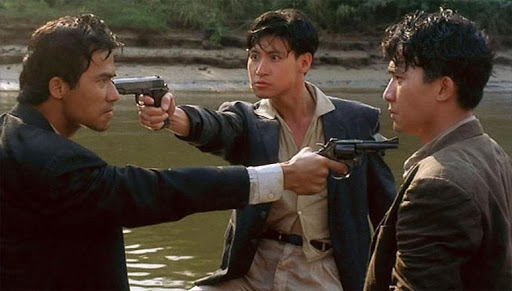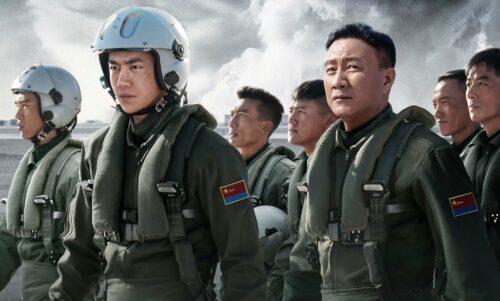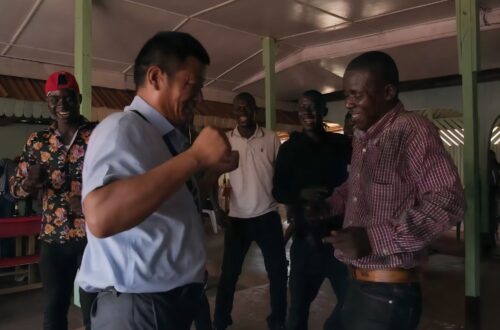‘Bullet in the Head’: How the tragedy of June 4 influenced John Woo’s most underrated film
Bullet in the Head is unlike anything else in John Woo’s repertoire. It’s been compared to Apocalypse Now and The Deer Hunter in the way the characters endure one atrocity after another, struggling to hold on to their humanity.


When protesters took to Tiananmen Square in the spring of 1989, the people of Hong Kong followed the news closely. On May 21, more than a million people in Hong Kong gathered to march in solidarity with the Beijing demonstrators. Two weeks later, when the Tiananmen Square activists and students were suppressed and massacred, the reaction in Hong Kong was shock and despair. With the 1997 handover getting ever closer, June 4 also provoked an important question. If such a brutal suppression could happen on the mainland, then why not in Hong Kong as well?
Filmmakers in Hong Kong had already for some time been grappling with the implications of reunification with the mainland. In movies from the ’80s and ’90s, it’s not hard to find allegories or jabs at the Communist Party and impending handover in everything from gangster blockbusters to horror flicks to arthouse fare. Sometimes the overall message was optimistic, other times it was cynical and even apocalyptic. The Tiananmen Square Incident heighted Hong Kong filmmakers’ anxieties about the future, inspiring them to reference and reflect on the massacre in their work. Few directors and screenwriters, however, confronted the incident head-on.
Hong Kong director Clara Law (罗卓瑶 Luō Zhuōyáo) once noted that, “The golden rule is, don’t talk about politics, otherwise [the film] will be a flop.” (Indeed, Ringo Lam [林岭东 Lín Lǐngdōng] of City on Fire [龙虎风云 lóng hǔ fēngyún] fame believed that his complaints about what he thought was an obsession with June 4 in Hong Kong ultimately hurt his film career in the 1990s.) Bold movies like Sunless Days (没有太阳的日子 méiyǒu tàiyáng de rìzi) (1990), a globe-trotting documentary that recorded the reactions of the overseas Chinese community to the massacre, were generally not the standard. Instead, most filmmakers resorted to allusions and subtlety in order to express their feelings.
One of the most fascinating works to come out of this reckoning was John Woo’s Bullet in the Head (喋血街头 diéxuè jiētóu) (1990), which chose the allegorical route.
Coming after The Killer (喋血双雄 diéxuè shuāng xióng) (1989), Woo’s Bullet in the Head is a ’60s-set epic about brotherhood, greed, and oppression. During the 1967 riots in Hong Kong, Ben, Frank, and Paul ignore the political turmoil around them to chase skirts, fight with rival gangs, and bike around the city. What appears on the surface to be a carefree youthful traipse ends with the friends’ murder of another thug, leading the young men to ditch Hong Kong for Saigon, where they plan to make a fortune from drug smuggling. As they run through a country torn by civil war, Paul and his two blood brothers witness and experience horrific violence by both the South Vietnamese authorities and the Vietcong. They have several close encounters with death, get involved with a mysterious French-speaking gangster, and desperately try to get back to Hong Kong with a box of gold.
For a man who’s honed a career out of stylish, gory violence, Woo might be an odd candidate for making a movie that criticizes the brutality and inhumanity of authoritarian regimes. Bullet in the Head is really unlike anything else in his repertoire; it’s been often compared to Apocalypse Now and The Deer Hunter in the way the characters endure one atrocity after another, struggling to hold on to their humanity. Originally, the movie was pitched as a prequel to A Better Tomorrow, but Woo left the project after a falling-out with producer Tsui Hark (徐克 Xú Kè). Tsui ended up directing the prequel himself, making a movie with a lot of basic similarities, including a Vietnam War-era setting. While it didn’t help that Bullet in the Head was released 10 months later, perhaps duping some viewers into thinking it was a rip-off, Woo’s effort is the more personal and intense of the two.
In fact, Bullet in the Head is probably the most personal movie John Woo has ever made. Like the main characters, Woo grew up in the slums of Hong Kong, and he modeled the first part of the story on his childhood. Describing Ben in a 1995 interview with writer Ted Elrick, Woo remarked that “that’s me exactly,” citing their shared love for Elvis Presley, their mothers, and the church. The second half, set during the horrors of the Vietnam War, was initially placed in Indonesia. But after the Tiananmen Square protests, Woo was so disturbed that he rewrote the location to the more politically-charged Vietnam. Bullet in the Head, with its depictions of paranoia, repression, and state violence, became Woo’s expression of his own despair over June 4.
“I was very sad, very upset, and felt ashamed for our country,” Woo explained in the same interview. “It was so inhuman to kill the students…When I shot the movie, I almost went crazy because I shot the film with pain. I kept thinking of the tragedy.” The movie’s images of policemen battering students and tanks being sent after civilians are obvious parallels, but Bullet in the Head goes further in its commentary than just recreations. Woo used Vietnam, then divided between the pro-American/capitalist South and Communist North, to envision — some might say prophetically, given recent events — the future of Hong Kong. Woo’s proxy is depicted as chaotic and indifferent to human life, a place where nobody can be trusted, and ordinary people are at the mercy of forces far greater than themselves.
There’s a deep sense of suspicion in this world, where violence and distrust are everywhere. When Ben and his pals barely survive a bombing, the South Vietnamese authorities line up whoever they can find and execute whoever they judge guilty, shooting their victims in front of children and nuns. Later, in an especially haunting scene, the three men are captured by the Vietcong, accused of being CIA spies, and forced to shoot POWs. The disregard for life and overwhelming paranoia gradually wear down on Ben and his friends’ own loyalty to one another, resulting in one of them doing whatever it takes to survive and get what they want. In the end, even after two of the men return to Hong Kong, there’s the feeling that they can never really go home again. A character caught in the Hong Kong riots, much earlier in the movie, foreshadows the sentiment with the declaration that everywhere is the same, no matter where they go.
Much to John Woo’s disappointment, Bullet in the Head was a box office failure in Hong Kong. By local standards, the movie was extremely expensive to produce, and Woo was forced to cut his original vision down by a half-hour, so to make the movie shorter and commercially friendlier. The bleak tone, and the references to Tiananmen Square and the feelings and meanings brought with it, unnerved audiences. There were also many negative reviews, and while critical reception was warm overseas, Woo was hurt that a project he poured his heart into was so reviled in the place where it might have been relevant most.
Time has been kinder to Bullet in the Head. Some critics now consider it Woo’s strongest work, if not his most heart-pounding, meaningful, and underrated. The elaborate action and epic scale are first-rate, but the symbolism and tragedy of the story is what makes the movie so harrowing, an unforgettable outpouring of grief, nervousness, and intensity fueled by an event that rattled the globe, and pressed by a future that seemed like the end of the world. In a Hong Kong film industry increasingly squeezed by mainland regulations and tastes, Bullet in the Head couldn’t possibly be made today. Given Woo’s participation in The Founding of a Party (建党伟业 jiàndǎng wěiyè) (2011), a star-studded ode to the founding of the CCP, perhaps his feelings aren’t the same anymore, either.





